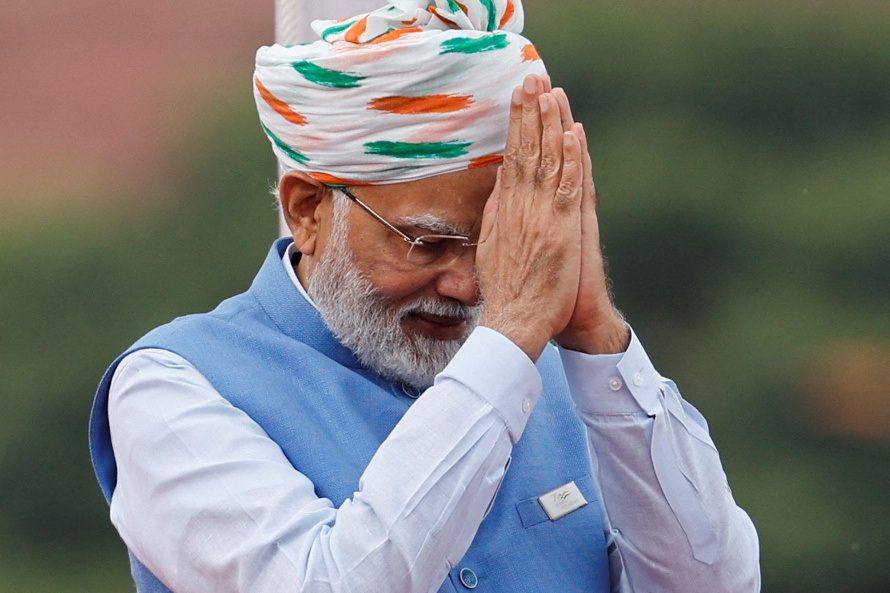
In Amethi, a small town nestled in the Indian state of Uttar Pradesh, the political landscape is witnessing a unique integration of technology and welfare policies, spearheaded by Prime Minister Narendra Modi’s Bharatiya Janata Party (BJP). As the national election draws near, the BJP’s local officials are utilizing sophisticated data management tools to ensure their message reaches every voter, exemplified by their recent interaction with 80-year-old farmer Durga Prasad.
While resting under a tree in front of his home, Prasad was approached by local BJP official Vinod Misra and his team. With a few taps on a smartphone app, they demonstrated a deep knowledge of Prasad’s personal benefits from government programs. Prasad confirmed receiving annual installments of 2,000 rupees (approximately $72) from a farmers’ welfare program prominently branded by Modi.
The conversation quickly shifted to other benefits, like monthly rations of rice or wheat, indicating that these small but significant aids form a crucial part of Modi’s appeal to the vast majority of Indians who earn too little to file income taxes.
The scope of Modi’s welfare programs is vast:
- Food Security: 821 million citizens benefit from 5-kilogram sacks of free rice or wheat each month, a program bolstered by a commitment of US$142 billion.
- Housing: Since 2015, 15 million homes have been built, costing about US$3 billion annually.
- Infrastructure: Millions of toilets have been constructed and efforts are ongoing to provide piped drinking water to every home.
These initiatives, branded with Modi’s image and name, are pivotal in reaching out to the electorate, especially in rural or impoverished regions.
The BJP’s integration of technology is a game changer in how election campaigns are conducted. An app called Saral, used extensively by party workers, provides detailed insights into the demographics and needs of voters. This app allows party workers to access a comprehensive database of beneficiaries, enhancing the precision of their door-to-door campaign efforts.
- Data Access: Provides detailed information on voters, including their benefit status and personal contact details.
- Performance Tracking: Gamifies the outreach process, comparing workers against each other based on their campaign effectiveness.
- Government Interface: Helps workers assist voters in smoothing out the receipt of government benefits, blurring the lines between government service and political campaigning.
During their campaigns, BJP workers like Misra engage directly with residents, using personal anecdotes and visible proofs of government assistance. For instance, they remind voters about the tangible benefits received, like housing or cooking gas, linking these directly to Modi’s policies.
In Pushkar, another town in the Hindi-speaking belt and a stronghold of the BJP, local party worker Shakti Singh Rathore demonstrated the app’s utility by showing how he plans to mobilize voters using detailed voter data. The party’s sophisticated data management not only ensures effective communication but also facilitates a personalized approach, which is often decisive in gaining voters’ trust.
While some voters remain indifferent to the extensive data collection, others appreciate the proactive approach BJP workers take in ensuring they receive entitled benefits. The party’s strategy of blending technological prowess with welfare politics has been largely well-received, although concerns about privacy and the extensive use of personal data by a political entity persist.
The effectiveness of this strategy is reflected in the words of Pradeep Gupta, director of Axis My India, who notes that tangible results in welfare delivery greatly influence voter decisions. In his words, “If a politician delivers on promises, the people elect you again and again.”
However, not all interactions are straightforward. In an encounter with farmer Dinesh Maurya, BJP worker Ajay Singh Gaur faced complaints about damages to Maurya’s crop due to a faulty electrical wire. Gaur’s assurance of resolving the issue and providing compensation reflects the party’s commitment to addressing individual grievances, showcasing their hands-on approach to voter engagement.
As the national election approaches, the BJP’s strategy in Amethi and similar regions highlights a sophisticated blend of technology, welfare politics, and personal engagement. This approach not only strengthens Modi’s mass appeal but also sets a new standard in how technology can be leveraged to enhance political campaigns, making every vote and voter count.
Related News:
Featured Image courtesy of PBS
